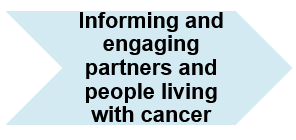Informing and Engaging Partners ('doers') & people living with cancer
(Corresponds to Green Rooms RP resource sections a/d/e/h)

Scenario
Induction with a new Macmillan professional
Objective
- I want to increase my knowledge about the Recovery Package
- I want to ensure that stakeholders and I are on the same page when talking about the Recovery Package
- I want to be able to signpost people towards useful Recovery Package resources
Resources & Guidance
- Signpost them to the Macmillan RP resources external webpage
- Send them the link to Macmillan’s Recovery Package video
- Encourage them to complete the ‘Introduction to the Recovery Package’ Learnzone module here
- Invite them to sign up for a one-day ‘Understanding the Recovery Package’ course here
The RP Evidence Base Summary provides the evidence base behind the key interventions. You could use this to talk through and help illustrate the need for Holistic Needs Assessments (HNA), Treatment Summaries (TS), Cancer Care Reviews (CCR) and Health & Wellbeing (H&WB), and their contribution towards particular outcomes. Make sure to read the notes in the slides which provide important context.
It might also be useful to share:
- The Definitions Document, - a common description of the RP: what it does, how it works, and for whom
- The Outcomes Framework, which sets out the key outcomes we expect the RP to achieve or contribute towards
Running / supporting an RP educational session at a partner organisation (for Macmillan professionals and the wider workforce)
- I want Mac professionals I work with to feel confident delivering the RP
- I want to be able to signpost people towards useful Recovery Package resources
- Deliver (or support the delivery of) the master RP half-day presentation (can be split into two sessions) or the intervention-specific slides, which can be delivered as one-hour sessions. These are also accessible in the from trh Midlands L&D Team.
- Share or demonstrate the HNA and Care Planning e-learning resource which is aimed at anyone who is interested in delivering HNAs or is providing training to support those delivering HNAs. It includes two video examples of how HNAs may be undertaken.
- Extract relevant sections from the Definitions Document and Outcomes Framework and use these as a prompt for discussion around RP implementation in the local context
- Use data (if available) relating to RP implementation in their organisation or local area – for example, from the eHNA data dashboard or quarterly RP data reports accessible here
- Take along relevant RP resources/information for staff and patients – available via be.Macmillan or the resources webpage
Working with resistance and practical challenges, e.g. a CNS who is reluctant to engage with HNAs due to limited capacity
- I want stakeholders to understand the value of the RP
- I want to be able to use existing evidence to influence partners around the Recovery Package
Depending on the particular challenge, draw on the most suitable resources from the list below:
Acute settings:
- RP Evidence Base Summary slides on need and outcomes relating to HNAs, TSs (slides 5 & 6) and HWBEs (slide 8)
- ‘How to guides’ for
- HNA and Care Planning e-learning/video resource
- Outcomes Framework
- Demonstrate the valuable insights provided by the Macmillan eHNA tool using the data dashboard, and share the eHNA FAQ if their organisation has not yet signed up
Primary care:
- RP Evidence Base Summary slides on needs and outcomes relating to CCR (slide 7)
- CCR resources one-page guide for GPs (link to be added once ready)
- Macmillan Carrying out an effective CCR 10 Top Tips
- Nottingham CCR poster – an example of developing a CCR template and bringing it into general practice locally
- Patient prompt tool – questionnaire to send to patients before a CCR
- Recovery Package FAQ aimed at GPs and primary care
- ‘Am I meant to be okay now?’ - Life with Cancer report
Informing and engaging people living with cancer (PLWC) around the RP (directly or via professionals)
I want to increase awareness of the Recovery Package and the difference it can make amongst PLWC, thereby increasing the likelihood of their asking for elements of it
Share or order the following resources:
- Your support and follow-up care: helping you take an active role in your cancer care, which is a resource for PLWC that introduces the concept of supported self-management as well as the components of the Recovery Package
- What to do after cancer treatment ends: 10 Top Tips
© Copyright Recovery Package